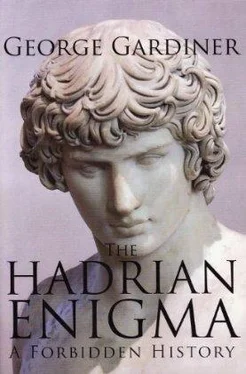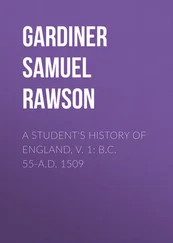George Gardiner - A Forbidden History.The Hadrian enigma
Здесь есть возможность читать онлайн «George Gardiner - A Forbidden History.The Hadrian enigma» весь текст электронной книги совершенно бесплатно (целиком полную версию без сокращений). В некоторых случаях можно слушать аудио, скачать через торрент в формате fb2 и присутствует краткое содержание. Жанр: Исторические приключения, на английском языке. Описание произведения, (предисловие) а так же отзывы посетителей доступны на портале библиотеки ЛибКат.
- Название:A Forbidden History.The Hadrian enigma
- Автор:
- Жанр:
- Год:неизвестен
- ISBN:нет данных
- Рейтинг книги:5 / 5. Голосов: 1
-
Избранное:Добавить в избранное
- Отзывы:
-
Ваша оценка:
- 100
- 1
- 2
- 3
- 4
- 5
A Forbidden History.The Hadrian enigma: краткое содержание, описание и аннотация
Предлагаем к чтению аннотацию, описание, краткое содержание или предисловие (зависит от того, что написал сам автор книги «A Forbidden History.The Hadrian enigma»). Если вы не нашли необходимую информацию о книге — напишите в комментариях, мы постараемся отыскать её.
A Forbidden History.The Hadrian enigma — читать онлайн бесплатно полную книгу (весь текст) целиком
Ниже представлен текст книги, разбитый по страницам. Система сохранения места последней прочитанной страницы, позволяет с удобством читать онлайн бесплатно книгу «A Forbidden History.The Hadrian enigma», без необходимости каждый раз заново искать на чём Вы остановились. Поставьте закладку, и сможете в любой момент перейти на страницу, на которой закончили чтение.
Интервал:
Закладка:
"No excuses, Special Inspector. Get on with it," Hadrian huffed.
The emperor slumped deep into his throne as the workers bustled silently around him eliminating the odious effluvium of his discharge. Suetonius braced himself as Clarus stood firm nearby concealing sweating palms.
"Firstly, my Lord, a chain of violent events begins when Antinous is found lying beneath a moored fishermen's coracle at the river's edge at first light two dawns ago. That day was the morning of the first day of The Festival of Isis.
Two netters of fish and birds, Ani and Hetu of the village of Besa nearby, drag the body of the youth from the river and raise the alarm. Antinous was beneath the river's waters attired in his ceremonial parade uniform as a Hunt Companion, still wearing the helmet and cavalry mask of a formal imperial parade. It is the regalia of a special ceremony, not of a casual night's pleasures or some sporty lad's horseplay.
Ani and Hetu call for help. Fortuitously, a troop of three members of Governor Flavius Titianus's Praetorian Guard from Alexandria happen to be nearby under the command of Centurion Quintus Urbicus of Numidia. Urbicus and his troops try to revive Antinous, but to no avail. They aim to clear his lungs of water and search his body for signs of the cause of death.
Other than light bruises, the only visible wound is a deep incision in the lad's left wrist. The guardsmen do not report the wound, leaving this revelation to an official magistrate's enquiry or inspection by a physician.
Later when checking the young man's attire it is noted how two of the lad's personal possessions are missing — his youth's bulla locket, the golden necklet containing some favored scripture or charm, and his ring depicting the deity Abrasax, known to be a gift received from you, Caesar, as a protective talisman.
Ani and Hetu later report to us how the only vessel sailing on the river at such early light was a single craft identified by them as bearing the insignia of the priests of the very Temple of Amun we currently inhabit. Their recorded testimony says it is possible those sailing this vessel had deposited the youth at the river's edge and hurriedly departed the vicinity."
Suetonius paused to let the information sink in to his audience, and give him time to assess his next stage of description.
On hearing about the Temple vessel the security chief Tribune Lucius Macedo made a discreet gesture to one of his officers. Guardsmen closest to the priests Pachrates and Kenamun quietly shifted into a formation of nearer proximity to the pair, much to their immediate alarm. Suetonius continued his presentation.
"One of these two fishermen, Ani, is murdered later that same night by masked assailants of unknown origin. Fortunately, we had inscribed a record of the fishermen's testimony. The following morning Ani's decapitated head is exhibited to us by Centurion Urbicus as evidence of the murder. Urbicus had been assigned to us as an investigative operative. Hetu, the other fisherman, is reported chased by the same masked assailants to a fate unknown at this particular time. I will return to Hetu later.
Lysias of Bithynia, Antinous's close friend, and Thais of Cyrene, the youth's language tutor, are attacked at their tents in the Imperial Encampment that same night, also by masked assailants. Simon, a steward of Lysias's household, is murdered and decapitated defending the couple. They flee by devious routes to take secret refuge at the compound of the Companions of the Hunt. Quaestor Salvius Julianus, the former Master of the Hunt, offers his protection to the two at the Companions' stables.
At early afternoon the following day — this was yesterday — our party of three citizens of Rome — Quaestor Julianus, Senator Clarus, and myself of the equites class — accompanied by three worthy staff, are attacked by concealed archers while we were travelling from a riverside jetty to the Hunt compound. Julianus's equerry is wounded in the foot, but all six survive the attack unharmed.
Since that time your investigators suspect their lives are at risk, having been set upon by unknown forces bent on committing harm for unknown reasons of purposes.
So Great Caesar, to tally up, in the space of only two days within the confines of the protected enclave of the Imperial Household your assigned investigators are confronted by the inexplicable drowning of an innocent youth, Antinous; two or possibly three assassinations by decapitation; a murderous attack by unknown archers in which an equerry is wounded; and a general climate of insecurity and uncertainty within the enclosure.
This is a high casualty rate for such a secure facility in the space of two nights — four unexplained deaths and a life-threatening injury, along with general mayhem and havoc. It is my belief, sir, these events are closely linked."
"Linked by who or to what?" Hadrian murmured tiredly. His features displayed a distinct lack of enthusiasm for Suetonius's presentation.
"I must raise the renown principle of cui bono? sir. Who benefits? It seems a member or members of our court may have good reason to see these offences come to pass. I include the death of the young man Antinous as the primary offence. There appears to be some person or persons among us who possess the resources, the authority, or the determination to prosecute such violence in our midst, Caesar."
Hadrian shifted uneasily in his seat.
"Explain, Inspector! Why do you believe the youth was subject to violence? Importantly too, who can be shown to benefit from Antinous's death?"
"Possibly several people my lord, either directly or by purposeful influence."
"Get to the core of the matter, Special Inspector. Time is passing. Dawn is almost upon us," Hadrian declared impatiently.
"I will be brief, Caesar. Let us first explore our present company at Court to see what motives may exist among us. We will begin with the outer ring, those who are not official members of your Household, the priests of Amun before us. Pachrates the Sage of Heliopolis, and Kenamun the Embalmer, should tell us what they know of the youth's death," Suetonius offered. He gestured to Kenamun nearby as he spoke.
"Kenamun, as the presiding mortician, has an intimate knowledge of the state of Antinous in death, my lord. We should listen to what he has to say on the manner of Antinous's death."
Kenamun glanced nervously at the surrounding assembly of notables and the somber emperor before him. Suetonius nodded to him encouragingly and opened his questioning.
"Priest Kenamun, what can you tell us of the manner of the young man's death?"
Kenamun gulped nervously. His response tumbled out.
"Special Inspector, it is my belief Antinous of Bithynia did not die by drowning. I believe he died instead of a loss of blood which occurred before he entered the holy river's waters. Possibly well before."
A rustle of whispers swept the assembly. Hadrian shifted uncomfortably on his throne. Kenamun continued.
"In preparing the noble youth's cadaver for public display it was evident how very little blood had remained in his veins in the usual way of the deceased. When blood ceases its flow at death a residual quantity lingers in the veins. It coagulates in the veins as mucus which speedily putrefies.
In the case of Antinous, there was very little blood gelled in his veins. Very little indeed. I would hazard a guess he had been thoroughly drained of almost all blood while his life-force still animated his tissues. The faint blood which remained suggested he had died by massive bleeding at least an hour or more before his discovery at the river. This is my opinion.
Also, Antinous possessed a deep incision on his left wrist. It was an incision as a surgeon might perform, not an accidental tear. This tells me he had intentionally cut and bled himself. Alternatively, he had been purposefully cut by another as a slaughtered beast is bled of its impure blood."
Читать дальшеИнтервал:
Закладка:
Похожие книги на «A Forbidden History.The Hadrian enigma»
Представляем Вашему вниманию похожие книги на «A Forbidden History.The Hadrian enigma» списком для выбора. Мы отобрали схожую по названию и смыслу литературу в надежде предоставить читателям больше вариантов отыскать новые, интересные, ещё непрочитанные произведения.
Обсуждение, отзывы о книге «A Forbidden History.The Hadrian enigma» и просто собственные мнения читателей. Оставьте ваши комментарии, напишите, что Вы думаете о произведении, его смысле или главных героях. Укажите что конкретно понравилось, а что нет, и почему Вы так считаете.












